"The resistance will continue on this path, method and basics, and don’t be worried, because those who are worried and who are weak today are Israel and America."
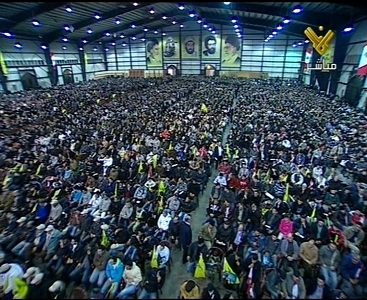 Hezbollah held on Thursday the “ceremony of loyalty to the martyr leaders” in Sayyed Al-Shohada complex in the Southern Suburb of Beirut.
Hezbollah held on Thursday the “ceremony of loyalty to the martyr leaders” in Sayyed Al-Shohada complex in the Southern Suburb of Beirut.
After reciting verses from the Holy Quran, playing the national anthem, Hezbollah’s anthem, and some revolutionary songs, Ragheb Harb, son of Sheikh Ragheb Harb made a statement.
Harb assured, during the event which Hezbollah holds yearly to renew its pledge of commitment to the path of the martyr leaders Sayyed Abbas Al-Moussawi, Sheikh Ragheb Harb, and Hajj Imad Mugniyeh, that “we thank Allah on daily basis because he chose for our fathers to be martyrs”, and vowed the stay on the path that those leaders drew.
Hezbollah Secretary General Sayyed Hasan Nasrallah appeared after that through a huge screen and delivered a speech which he began by expressing his condolences over the departure of Sayyed Abbas Al-Moussawi’s father who passed away Wednesday night.
The Martyr Leaders Established Firm Method for Resistance
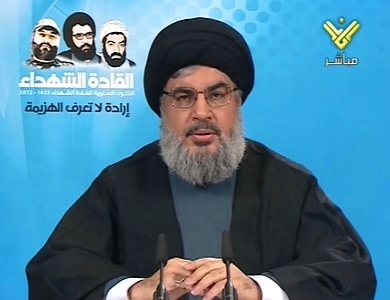 After that, Sayyed Nasrallah spoke about the virtues of these leaders, considering that one of the common virtues among them was that “they where the establishers of this resistance and path… They had a major affect in stabilizing the bases, culture, and method of the resistance.”
After that, Sayyed Nasrallah spoke about the virtues of these leaders, considering that one of the common virtues among them was that “they where the establishers of this resistance and path… They had a major affect in stabilizing the bases, culture, and method of the resistance.”
“These leaders were able to stabilize this method, which Hezbollah still commits to, and this is one of the main reasons behind the firmness of this path… the firmness of its track, stances, alliances, vision and strategies,” he said, adding that “by the blessings of those martyr leaders, by their lives, words, acts, jihad, resistance, blood and martyrdom, the resistance was firmly established.”
“Therefore, God willing, you see that the resistance, and after 30 years of its establishment, is still strong, solid, firm, clear and certain.”
“This is why all the stances we take are not based on our tempers, emotions, worries, or personal benefits… but rather on the good of the nation, country and people whom we are defending their freedom, dignity, and independence, and whom we are part of. At the head of this method is our stance from the Zionist project in the region… We specify this stance based on our humanitarian, moral, ideological, patriotic, and national belonging, and then we take action against this offensive project,” Sayyed Nasrallah explained.
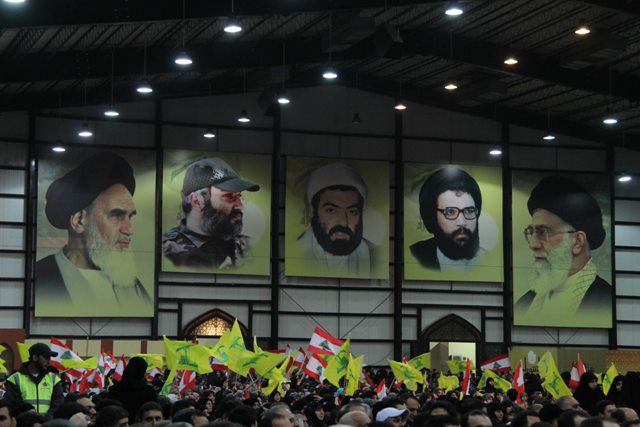 He continued: “The dangerousness of the Zionist project which Israel embodies in this region involves the entire nation, and when we take our stance from it, it is first because this project is occupying Palestine, the Muslim and Christian sanctities in Palestine, is working on Judaizing Al-Quds, and is oppressing the Palestinian people, and second because it is a danger to all the countries in the region.”
He continued: “The dangerousness of the Zionist project which Israel embodies in this region involves the entire nation, and when we take our stance from it, it is first because this project is occupying Palestine, the Muslim and Christian sanctities in Palestine, is working on Judaizing Al-Quds, and is oppressing the Palestinian people, and second because it is a danger to all the countries in the region.”
Sayyed Nasrallah considered that “in the past 60 years, some regimes and governments in the Arab world have colluded with the West on the account of Palestine and the nation’s benefits, and worked on keeping and strengthening this entity, which made the nation lose the hope of triumphing over it… these regimes where very truthful and loyal to America and Israel, and made all their efforts to implement their project,” and stressed that “the enemy admits now that Israel is no longer invincible.”
“…. On the other hand, there are regimes that took opposing stances and suffered dangers, sanctions, and great conspiracies. When I belong to this method and this cause… Is it fair to equalize between these two regimes? Regimes that made the impossible so that Israel remains, and others that made the impossible so that Palestine remains and the resistance triumphs?”
Israel Worried about Its Existence
Sayyed Nasrallah pointed out that "we need this method to understand what is going on around us," and added: "the perspective we take in reading the regional situation begins with Israel, its actions, and the opportunities it waits for… Where is Israel regarding what is happening in the region, especially in Egypt, Syria, Iraq, Lebanon, and Palestine?"
He pointed out to the sufferings of the Palestinian people, and the detainees in the Israeli prisons in specific.
“There are thousands of Palestinian detaines in the Israeli prisons, and a big number of them is now on a hunger strike. Detainee Khodor Adnan has been on a hunger strike for over 60 days and is now facing the danger of death due to this stance. Where is the Arab League, where are the Arab media and people from this issue?”
“If Khodor Adnan was an Israeli, would the world act in a similar way with a man who is suffering death because he is demanding righteous issues?”
“If Khodor Adnan was an Israeli, the Arab governments would have been taking action. If an Israeli was a detainee held by the resistance, wouldn’t Arab Kings and presidents interfere to check up on him?”
The Hezbollah secretary General also indicated that "during the Herzliya conference, Barak said that the political and security challenges that Israel is facing are more crucial than those faced by the ancestors who established Israel… At a time when Israel is supposed to be moving towards more power, Israel is speaking about a danger threatening its existence as a result of the jihadi resistance and the resistance fighters' sacrifices."
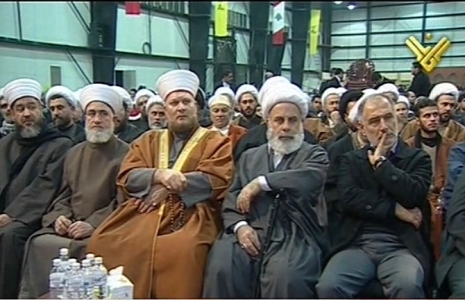 He continued that "Netanyahu said after the withdrawal from Lebanon and from the Gaza Strip, and after the second Lebanese war, that Israel is no longer an invincible state… this was before the fall of Mubarak's regime and the US pull out from Iraq, so what is the case today? As they mourned Mubarak's fall… Iraq was a protector to Israel. Today Netanyahu says that Iraq has become an ally of Iran. The military power was basic for Israel, but the Gaza and Lebanon wars have proven that the aerial power is incapable of ending a battle, so is the land power."
He continued that "Netanyahu said after the withdrawal from Lebanon and from the Gaza Strip, and after the second Lebanese war, that Israel is no longer an invincible state… this was before the fall of Mubarak's regime and the US pull out from Iraq, so what is the case today? As they mourned Mubarak's fall… Iraq was a protector to Israel. Today Netanyahu says that Iraq has become an ally of Iran. The military power was basic for Israel, but the Gaza and Lebanon wars have proven that the aerial power is incapable of ending a battle, so is the land power."
"The basic element of the enemy's power is this nation's weakness," Sayyed Nasrallah added.
"The Israeli Mossad Chief Meir Dagan told reporters a few days ago that “Hezbollah has of the rockets and arms strength what 90% of the countries in the world don't have," his eminence said, adding "God knows if this is true or not. But it is enough for Israel to believe that the Lebanese resistance has this much power, to prevent any aggression and protect the country.”
On the other hand, Sayyed Nasrallah considered that "Israel sees an opportunity in Egypt," and addressed the Egyptian people saying that "in every riot, crisis, or sectarian incitement in Egypt, search for the Israeli and the American, and so is the case in Iraq after the US failed to stay there."
"They also have a great opportunity in Syria, which is toppling the regime. Barak says that the leadership is not always between two choices, a good and a bad one. Sometimes it is before a bad and worse choice, and Israel sees that any regime is better than Al-Assad's regime…. Israel sees that amid the current strategic environment in the region, the only hope for Israel in order to change this reality is to topple the regime in Syria,” he added.
Sayyed Nasrallah asked the Arabs to think deeply about the reason behind the world's insistence to topple the Syrian regime.
"Isn't it weird how America, the West, the moderate Arab states as well as Al-Qaeda are all on one position in toppling the regime? Can anyone argue that the Syrian regime is not resistant? This regime did not submit to America and Israel and did not sell the resistance… There are some negative points in this regime, and its leadership are aware of them and is seeking reforms," he said.
His eminence further pointed out that “arms were blocked from Palestine and from the resistance in Lebanon, even though Lebanon got arms, but in Syria, the Arabs announce clearly that they finance and send arms so that the Syrians fight each other. Why is that? And for who’s benefit?”
Bahrainis First Arabs to Protest in Solidarity with Palestine
In parallel, Sayyed Nasrallah tackled the Bahraini situation. He asked: “If you want to follow your method, why aren’t you with the people in Bahrain? Based on our method, yes, we are with the people in Bahrain because they are supportive and committed to the Palestinian cause and to confronting the Zionist project. I remind you here that when the war on Gaza began, the people in Bahrain where the first in the Arab and Islamic world to go out and protest in solidarity with Gaza. The Bahraini people are ready to do anything for Palestine. And when they used to protest in support of Palestine and Al-Quds, they used to be fired at by the Bahraini authority.”
“If one day the Bahrainis got to elect their own government, you would find that it would be a government completely supportive to the Palestinian cause. As for the current regime there, we all know its stance and position from Israel. Yet, we find that the Bahrainis are left alone and the regime is being defended,” he added.
On another regional level, his eminence said that “today, in Palestine, Al-Quds, Lebanon, Syria, Jordan, Iraq, and all the region, Israel’s major opportunity lies in spreading riot and incitements. Do we give Israel what it wants?”
“Of course, the Iranian advancement is a great worry for Israel, knowing that it is a peaceful one. But Israel observes Iran’s peaceful nuclear development on the military level on the long run…” he indicated, concluding the regional file by saying that “we should find a political solution on all the regional issues in order to frustrate any opportunity for Israel and prevent any sedition.”
Responding to March 14 Bloc’s Speech
Moving to the Lebanese file, Sayyed Nasrallah at first presented his condolences on the memory of former Prime Minister Rafiq Hariri and his companions’ assassination, condemning such kind of assassinations.
He assured that any call for dialogue without preconditions is welcome and accepted, because usually in a national dialogue no part should impose conditions or opinions on another, but rather discuss all the points.
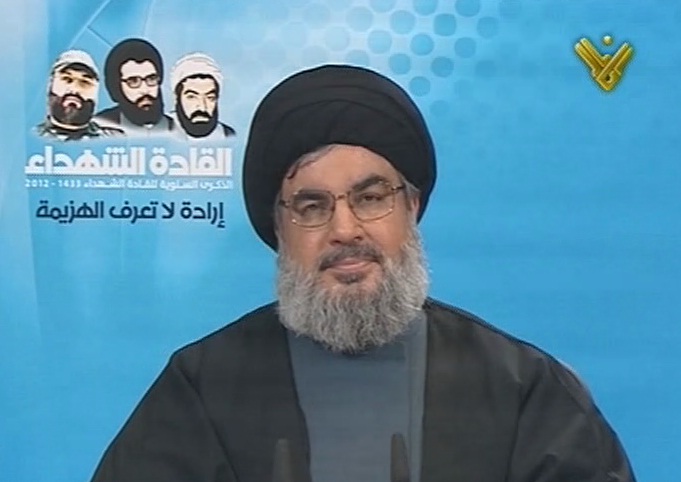 His eminence said he will respond to the speeches that “March 14” bloc leaders delivered during the ceremony they held on February 14 because they mainly focused on Hezbollah.
His eminence said he will respond to the speeches that “March 14” bloc leaders delivered during the ceremony they held on February 14 because they mainly focused on Hezbollah.
“Of course, if someone other than Dr. (Samir) Gaegae commented and counted the massacres it would have been better,” Sayyed Nasrallah said.
He pointed out that March 14 should have one measure in taking its stances and accused the group of igniting the situation in Syria and of sending arms and militants to the neighboring country.
“When one of our brothers was arrested in Egypt for the accusation of establishing a cell to topple the regime there, knowing that he was actually sending arms to the Gaza Strip, March 14 waged an attack on Hezbollah and accused it of dragging Lebanon into a crisis.”
Sayyed Nasrallah quoted Lebanese forces leader Samir Gaegae as saying then that “no party should allow itself to violate the laws of other countries, despite this party’s stance from the other countries.”
He asked: “Does Syria’s laws allow you and March 14 to send money and arms, and to incite the Syrians against one another?”
“If sending arms to the oppressed resistance fighters who are fighting the enemy of this nation was a condemned act, then how do you do the same thing in such a controversial case?”
Sayyed Nasrallah considered that March 14, which has always called for neutrality of stances even with Israel, did not act upon that in the Syrian issue.
He also pointed out that while Hezbollah is true about its source of finance, which is the Islamic Republic of Iran, March 14 has spent over 3 billion dollars in the past seven years and has not stated its source of finance.
“Why don’t you be honest with yourself, your people and the country and say your source? Where is all this money from and why are your receiving it?” His eminence wondered, indicating that “Iran did not give money to Hezbollah because it is a Lebanese political party, but because it is a resistance movement against the Israeli occupation… as for you, you are a political party, you have no relation with fighting Israel, so why are your receiving this money?”
Sayyed Nasrallah also assured that Hezbollah is clear about owning arms in order to defend the country and asked March 14 to admit that it also has arms.
He assured that “our only justification for our armament is that we use it for defending Lebanon and fighting the occupation, and not that we have it because other parties have it.”
Hezbollah secretary General also asked them: “Are you really convinced and are convincing people that the Arab Spring was the result of the “Cedar Revolution”?”
“The Arab Spring rose up against the regimes directed by Condoleezza Rice, Hilary Clinton and Jeffry Feltman. The same people who used to direct you in 2005 and still do. Before the fall of Husni Mubarak’s regime you all visited him one after the other,” he indicated, asking sarcastically: “And now you claim that you toppled Husni Mubarak’s regime?”
“If the Israeli war on Lebanon in 2006 and on Gaza in 2008 succeeded, if the US succeeded in hitting the Iraqi resistance, and the “New Middle East” that you were part of emerged, would there be an Arab Spring?” he continued, pointing out that this would have rather brought a harsh fall and winter to the Arab world.
Honorable Revenge for the Blood of Hajj Imad Mughniyeh
Regarding the blasts that fell in India, Georgia and Thailand, Sayyed Nasrallah assured that Hezbollah was not behind them.
He emphasized that “our revenge for the blood of Hajj Imad Mughniyeh is certain and it will not be against some Israeli diplomats or people… I tell you it would be shameful for Hezbollah to avenge its great jihadi leader's assassination by killing some people or diplomats.”
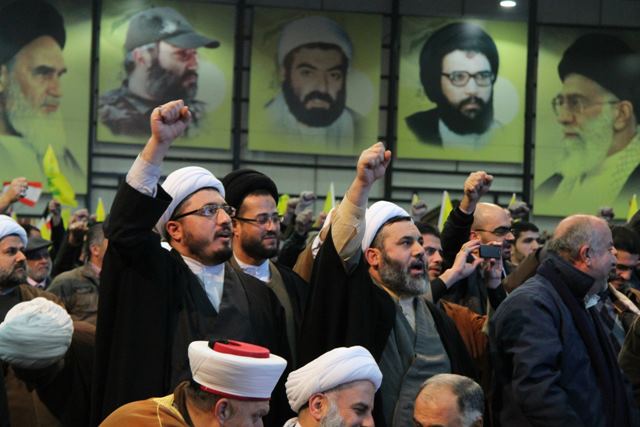 “Those who are in the circle of target know themselves, and take serious measures when they move in any place in the world. I tell them to stay like this, because as long as there is still one man, woman, or child in Hezbollah, the day will come when we will take an honorable revenge for Hajj Imad Mughniyeh,” his eminence stressed.
“Those who are in the circle of target know themselves, and take serious measures when they move in any place in the world. I tell them to stay like this, because as long as there is still one man, woman, or child in Hezbollah, the day will come when we will take an honorable revenge for Hajj Imad Mughniyeh,” his eminence stressed.
In conclusion, Sayyed Hasan Nasrallah pointed out that some parts have drawn a negative future for the region and considered that Hezbollah will have to resort to Israel for help. He assured that this is shameful and reminded that Sheikh Ragheb Harb was killed because he refused to shake hands (with the Israeli).
“That is our sheikh…all our martyrs and leaders were martyred because this resistance refused to compromise despite all the offers.”
He recalled the tough situation Hezbollah passed through during the July war in 2006, stating that “all the world was against us, the Lebanese government was against us, most of the international media was against us, a part of the internal society was against us, and we were under bombardment… and I say that I never came close to understanding Imam Hussein, except until the first days of July war, when they told us that we have two options, either to be crushed or to surrender, and then I instantly remembered Imam Hussein’s stance in Karbala...”
“I tell you that the resistance will continue on this path, method and basics, and don’t be worried, because those who are worried and who are weak today are Israel and America.”